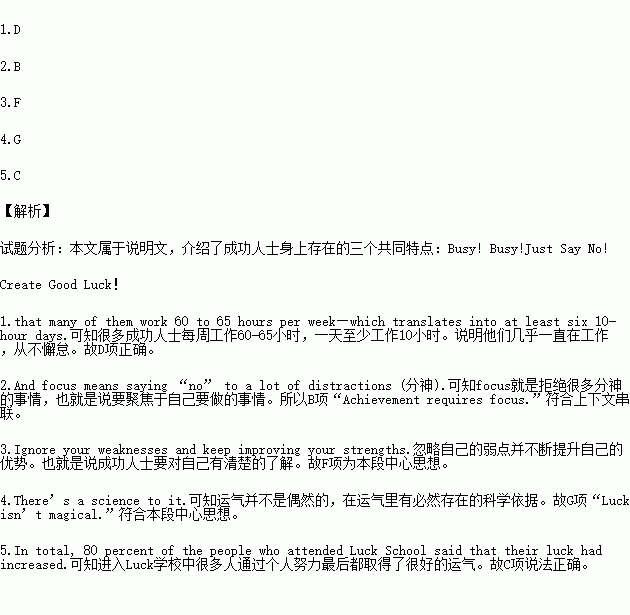题目内容
根据短文内容,从短文后的选项中选出能填入空白处的最佳选项。选项中有两项为多余选项。
What do the world’s most successful people all have in common?
By examining the work habits of over 150 greatest writers and artists and scientists, the researchers including Stanford professor Jeffrey Pfeiffer found that high achievers like Robert Moses turned out to be all alike:
Busy! Busy!
1. In a study of general managers in industry, John Kotter reports that many of them work 60 to 65 hours per week—which translates into at least six 10-hour days. The ability and willingness to work difficult and tiring hours has characterized many powerful figures. Energy and strength provide many advantages to those seeking to build power.
Just Say No!
The difference between successful people and very successful people is that very successful people say “no” to almost everything. And that’s what gives them the time to accomplish so much. 2. And focus means saying “no” to a lot of distractions (分神).
3.
Ignore your weaknesses and keep improving your strengths. Don’t waste time exploring skill areas where you have little competence. Instead, focus on—and build on—your strengths. This means knowing who you are, what you are and what you are good at.
Create Good Luck!
4. There’s a science to it. Richard Wiseman studies lucky people for his book Luck Factor, and breaks down what they do right. Certain personality types are luckier because they behave in a way that offers the chance for good opportunities. By being more outgoing, open to new ideas, following the feeling that something is true, and being optimistic, lucky people create possibilities.
Does applying these principles to your life actually work? Wiseman created a “luck school” to test the ideas—and it was a success. In total, 80 percent of the people who attended Luck School said that their luck had increased. 5.
A. Spend enough time to improve your weakness.
B. Achievement requires focus.
C. On average, these people reported that their luck had increased by more than 40 percent.
D. They never stop working and they never lose a minute.
E. Busy people are more likely to be lucky.
F. Know What You Are!
G. Luck isn’t magical.
 特高级教师点拨系列答案
特高级教师点拨系列答案最近你班同学开展了一场“司机醉驾是否应该处罚乘客”的讨论。请你根据下表提供的信息, 给报社写一封信, 介绍讨论的情况, 并发表你的看法。
少数同学赞成处罚乘客 | 大多数同学反对处罚乘客 |
1. 减少交通事故,促进交通安全 2. 不乘坐醉酒司机的车,不仅是对自己负责, 也是对司机和路人负责 | 1.乘客难以判断司机是否醉酒 2. 即使乘客知道司机饮酒, 如果司机不听从乘客的劝诫, 处罚乘客是不公平的 |
你的看法:…… |
Dear Editor,
I’m writing to tell you about the discussion we’ve had about whether passengers who ride in a car driven by a drunken driver should be punished.
_______________________________________________________________________________
Yours sincerely,
Li Yan
Anything that poses a challenge or a threat to our well-being is a stress.Some stresses get you going and they are good for you – without any stress at all many say our lives would be boring and would probably feel pointless. However,when the stresses undermine both our mental and physical health they are bad.In this text we shall be focusing on stress that is bad for you.
When we are stressed the following happens:
Blood pressure rises
Breathing becomes more rapid
Heart rate (pulse) rises
Muscles become tense
We do not sleep (heightened state of alertness)
Most of us have varying interpretations of what stress is about and what matters.Some of us focus on what happens to us,such as breaking a bone or getting a promotion,while others think more about the event itself.How you see that stressful event will be the largest single factor that impacts on your physical and mental health.Your interpretation of event and challenges in life may decide whether they are invigorating or harmful for you.
There are three broad methods you can follow to treat stress.
Self help for treating stress
Exercise has been proven to have a beneficial effect on a person's mental and physical state.For many people exercise is an extremely useful stress buster.
Alcohol and drugs will not help you manage your stress better.Either stop consuming them completely,or cut down.
If you consumption of coffee and other drinks which contain caffeine is high,cut down.
Eat plenty of fruit and vegetable.Make sure you have a healthy and balanced diet.
Talk to your family,friends,work colleagues and your boss.Express your thoughts and worries.
Stress management techniques
Stress management can help you t keep away from the source of stress,change the way you view a stressful event,and lower the impact that stress might have on your body.Stress management therapy will have the objective of pursuing one or more of these approaches.
Medicines
Doctors will not usually prescribe medications for coping with stress,unless the patient has an underlying illness,such as depression or some type of anxiety.If that is the case,the doctor is actually treating a mental illness.In such cases,an antidepressant may be prescribed.Bear in mind that there is a risk that all the medication will do is mask the stress,rather than help you deal and cope with it.
Stress | |
Passage outline | Supporting details |
Understanding of stress | • Stress is pressure or worry 1.by the stressors in your life. • Some stresses2.you while some others make you suffer. |
3.of stress | • You have 4.blood pressure. • Your heart5.f aster. • Your become sleepless. • Your breath and muscles are abnormal. |
Attitudes towards stress | • You care about what concerns6. • You pay attention to what is7.around you. • Above all,how you look at challenges affects your health. |
Ways to deal with stress | • Exercise,a proper diet,communication help to 8.your stress while alcohol,drugs and coffee do not. • Stress management guides you how to 9.and reduce stress. • Medicines can be used to treat a mental illness but cannot solve the problem 10. |


